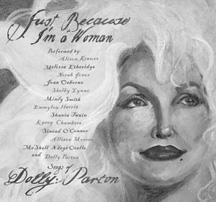Critics and listeners often overlook Dolly Parton’s artistry because of her gaudy dresses and set of generously proportioned biological accessories.
What these bug-eyed nay-sayers miss is one of America’s greatest modern songwriters whose ability to tug at or lift a listener’s heart sits comfortably among the likes of Bob Dylan, Bruce Springsteen and the late Johnny Cash.
Many of the music industry’s leading ladies recently paid homage to Parton’s songwriting prowess on the album “Just Because I’m a Woman – Songs of Dolly Parton.” Sugar Hill Records released the tribute this year to commemorate the 35th anniversary of the release of Parton’s first solo album, “Just Because I’m a Woman.”
The album’s first and second cuts are a one-two punch of genre-jumping gems.
Alison Krauss kicks off the tribute with “9 to 5,” a No. 1 pop hit for Parton in 1981. Krauss slows down the tempo with a bluegrass feel, and her voice – which rarely rises over a cooing lullaby in her own songs- ascends to exasperated shouts during the chorus of this working man’s (or woman’s) anthem.
Melissa Ethridge tackles “I Will Always Love You” in uncharacteristically subdued style. Ethridge avoids her own trademark snarls and the vocal acrobatics Whitney Houston employed in her hit version in favor of softer singing that accentuates the pain and desperation of Parton’s lyrics.
Folk rocker Joan Osborne also takes a stylistic detour on her rendition of “Do I Ever Cross Your Mind.” Osborne makes like a country singer with the song’s sparse acoustic guitar arrangement.
Included on the album is Emmylou Harris’s 1978 version of “To Daddy,” which tells the story of a man who neglects his wife and the mother of his children.
The song still sounds fresh and relevant as Harris’s angelic voice glides through the heart-wrenching story.
Shania Twain covers “Coat of Many Colors,” Parton’s semi-autobiographical story of a poor mother who sews her daughter a coat made of scrap cloth. Twain’s gloss-free, country crooning is a return to form with backing from Krauss and her band, Union Station, and some harmony vocals by Parton herself.
The album’s most interesting interpretation is Me’shell N’degeocello’s take on “Two Doors Down.” Parton hardly could have imagined one of her songs being put to a hip-hop beat with lyrics rapped in a breathy whisper the way N’degeocello does.
Parton closes the album herself with an updated version of “Just Because I’m a Woman.” The modern, bluesy version leaves listeners expecting still more classic songwriting in the future from this American musical treasure.
“Just Because I’m a Woman – Songs of Dolly Parton” is a hodgepodge of singers, styles and songs.
It is a true tribute that showcases Parton’s ability to produce quality songs that are enjoyable in various interpretations.
Osborne’s description of Parton in the album’s liner notes as “a gifted artist cleverly disguised as a media superstar and sex bomb” is a perfect characterization.
With or without the outrageous image she has portrayed, Parton has added classic songs to the American catalogue that are sure to endure through genres and generations to come.
Parton tribute renews prestige
By Adam Causey
October 23, 2003

Parton tribute renews prestige



